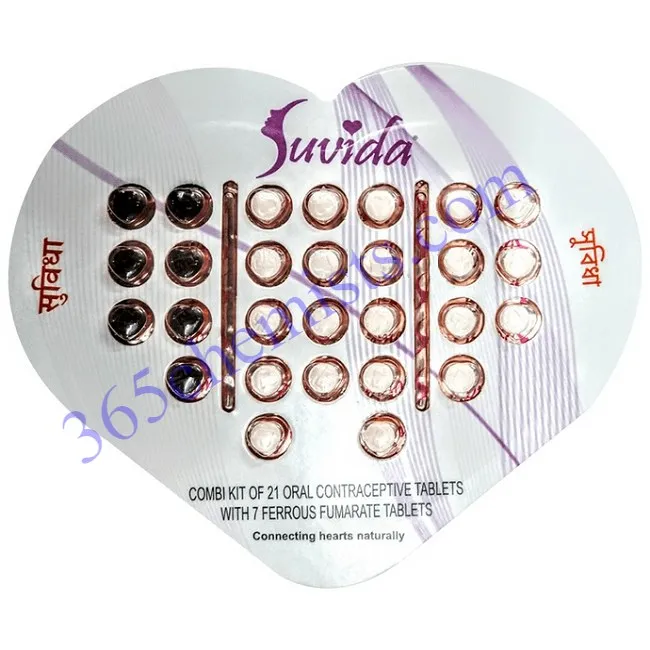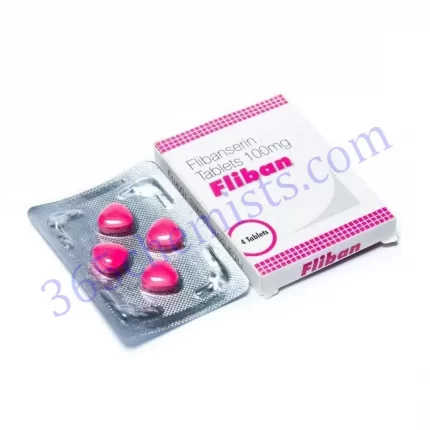Medical Description
Uses of Suvida Tablet
Contraindications of Suvida Tablet
-
If you are allergic to Levonorgesterol or Ethinylestradiol or any other ingredients of this medicine.
-
If you have a history of any blood clot formation or bleeding disorder.
-
If you have any problems with your heart like stroke, heart attack or chest pain.
-
If you have or had a history of migraine attacks.
-
If you had or have pancreas or liver problems.
-
If you have diabetes, high blood pressure or cholesterol.
-
If you have a history of vaginal bleeding (cause not established), absent periods for more than 3 months (amenorrhea).
-
If you have or are suspected of having breast cancer or cancer of the genital organs (private parts).
-
If you are taking treatment for Hepatitis C with a medicine that contains Ombitasvir/Paritaprevir/Ritonavir plus Dasabuvir.
Side effects of Suvida Tablet
-
Headache
-
Migraine
-
Nausea
-
Vomiting
-
Stomach pain
-
Diarrhoea
-
Weight gain
-
Skin allergies
-
Mood swings
-
Pain and tenderness of the breast
-
Reduced sex drive
Precautions and Warnings of Suvida Tablet
Pregnancy
Breast Feeding
Driving
Alcohol
Other General Warnings
-
You have a family history of breast cancer, diabetes, fits or other brain disorders.
-
You have high blood pressure or cholesterol.
-
You have a disease of the liver, gall bladder or inflammatory bowel disease (Crohn’s disease or ulcerative colitis).
-
You have a blood disease that damages the kidneys (hemolytic uremic syndrome).
-
You have an immune system disorder like systemic lupus erythematosus (SLE).
-
You have a history of pregnancy patches especially on the face (chloasma).
-
You have a disease that first appeared during pregnancy like porphyria (an inherited haemoglobin defect), hearing loss, gestational herpes (vesicular skin rashes during pregnancy) and Sydenham’s chorea (rapid, irregular movements of the body).
-
You have a family history or previous history of serious allergic reactions causing swelling of the face and throat, breathing difficulty, skin rashes and blisters (hereditary angioedema).
-
You should let the doctor or the laboratory person know that you are using this medicine while going for a lab test, as this medicine may interfere with the lab tests.
Mode of Action of Suvida Tablet
How Does It Work?
Suvida Tablet is an oestrogen-progestogen combination that works by preventing the release of the egg by the ovary, thickening vaginal secretions (blocking the sperm from reaching the egg) and thinning down the lining of the uterus. It helps in preventing the implantation of the egg if it is fertilized by any chance, thus preventing pregnancy.
Directions for Use of Suvida Tablet
-
Suvida Tablet should be swallowed as a whole, with a full glass of water. Do not break, cut or chew the medicine.
-
You should take this medicine regularly, at the same time and without fail as directed by your doctor.
-
You should not consume it more than that prescribed by your doctor.
Interactions of Suvida Tablet
Interactions with other medicines
-
Concomitant use of Suvida Tablet along with medicines used to treat fits (Phenytoin, Carbamazepine, etc.), medicines used to treat HIV infection (Nevirapine, Ritonavir), anti-infectives (Penicillin, Griseofulvin, etc.), medicines that increase the stomach and intestine problems (Metoclopramide) and herbal supplements like St.John’s Wort (used to treat a psychiatric illness), may alter the effects of Suvida Tablet.
-
Concomitant use of this tablet along with some anti-seizure medications like Lamotrigine and immunosuppressants like Cyclosporine (used to treat rheumatoid arthritis, psoriasis, Crohn’s disease) should be avoided.
-
Concomitant use of this tablet with certain antiviral medicines may affect your liver enzymes. Thus, this tablet should be stopped and can be restarted 2 weeks after completing the treatment.
-
Other medicines like Rifampicin and Carbamazepine should be used cautiously.
Storage and disposal of Suvida Tablet
-
Store Suvida Tablet below 25°C in a clean and dry place.
-
Keep the medicine away from children and pets.
-
Discard this medicine when it is expired or no longer needed.
Dosage of Suvida Tablet
Overdose
The symptoms of an overdose are nausea, vomiting or withdrawal bleeding. If you experience any of the symptoms or think you have taken too much of Suvida Tablet, contact your doctor immediately or visit the nearest hospital.
Missed a Dose
Missing a dose of Suvida Tablet may reduce the effectiveness of the treatment. If you have missed any dose of this medicine, take it as soon as you remember and continue with your regular dosing schedule. You should also inform your doctor and seek further advice.












